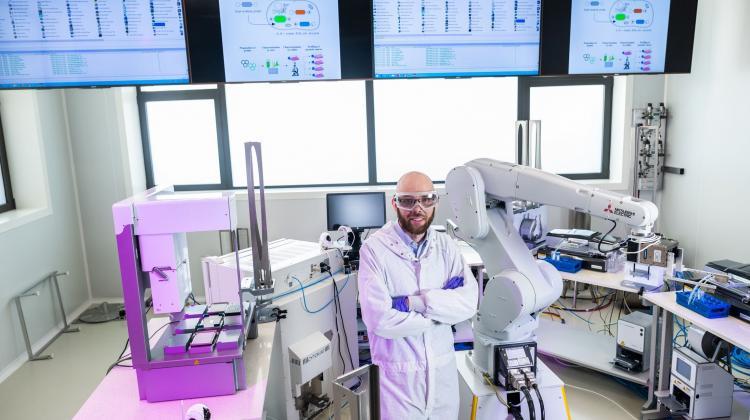Poznań probes to find how COVID-19 penetrates human cells
 Photo: press materials
Photo: press materials
Probes that will help study the penetration of SARS-CoV-2 into human cells are being developed by scientists in Poznań.
The tool is designed to help find drugs for COVID-19 and other viruses (e.g. influenza), and assess the susceptibility of different people to the infection.
The research is based on the assumption that in order to successfully fight the SARS-CoV-2 coronavirus, it is necessary to inhibit its penetration into human cells. Outside of cells, the virus cannot multiply and dies after some time.
Dr. Jacek Kolanowski from the Institute of Bioorganic Chemistry of the Polish Academy of Sciences in Poznań is working on creating a tool that will easily measure how much different cells (from different people or from different human tissues) differ in the amount of proteins that allow the virus to infect them.
This tool will then be used to quickly search databases containing thousands of different compounds to find the substance that will effectively block the coronavirus penetration into human cells.
He said: “We are developing a fluorescent probe for two analytes (substances detected in the sample - PAP) that play an important role in the mechanism of coronavirus penetration into host cells and have practical application in the search for potential drugs.”
Specifically, these are the proteins TMPRSS2 and ACE2 on the surface of human cells. Both are known to be involved in the process of virus entry into the cell, but their activity differs from cell to cell. The efficiency of coronavirus penetration into cells depends on the level of activity of these proteins.
Unlike many similar tools, the new probe will enable the simultaneous visualization of two selected biochemical parameters in living human cells.
Dr. Kolanowski said: “Our probe will visualize the activities of both proteins at once and it will be possible to use it in practice to search for drugs that would block these two activities. Blocking both proteins at the same time will certainly be more effective in the fight against the virus than blocking just one of them. Our tool will be a high-throughput test, which means that it will help us quickly search databases containing dozens or even hundreds of thousands of different compounds. We assume that we will develop such a probe within 12 months.”
The developed probe can be used more broadly, also in the search for anti-cancer or anti-hypertension drugs, because the two proteins are also involved in pathological processes related to the development of prostate cancer, hypertension and other cardiovascular diseases.
In addition, the tool can be used to assess the susceptibility of human cells to viral infection and, due to the similar penetration mechanisms of particles of various RNA viruses (other SARS viruses, influenza viruses), can be used for research on drugs for current and future pandemics.
Dr. Kolanowski's project is financed with EU funds from the European Regional Development Fund from the Smart Growth Operational Programme under the HOMING grant.
Nearly PLN 200,000 was awarded in a thematic competition for financing new research tasks related to the COVID-19 pandemic, carried out by the Foundation for Polish Science. The total budget of the competition was PLN 15 million. The funds were awarded for the implementation of 14 projects. (PAP)
lt/ ekr/ kap/
tr. RL
Przed dodaniem komentarza prosimy o zapoznanie z Regulaminem forum serwisu Nauka w Polsce.















